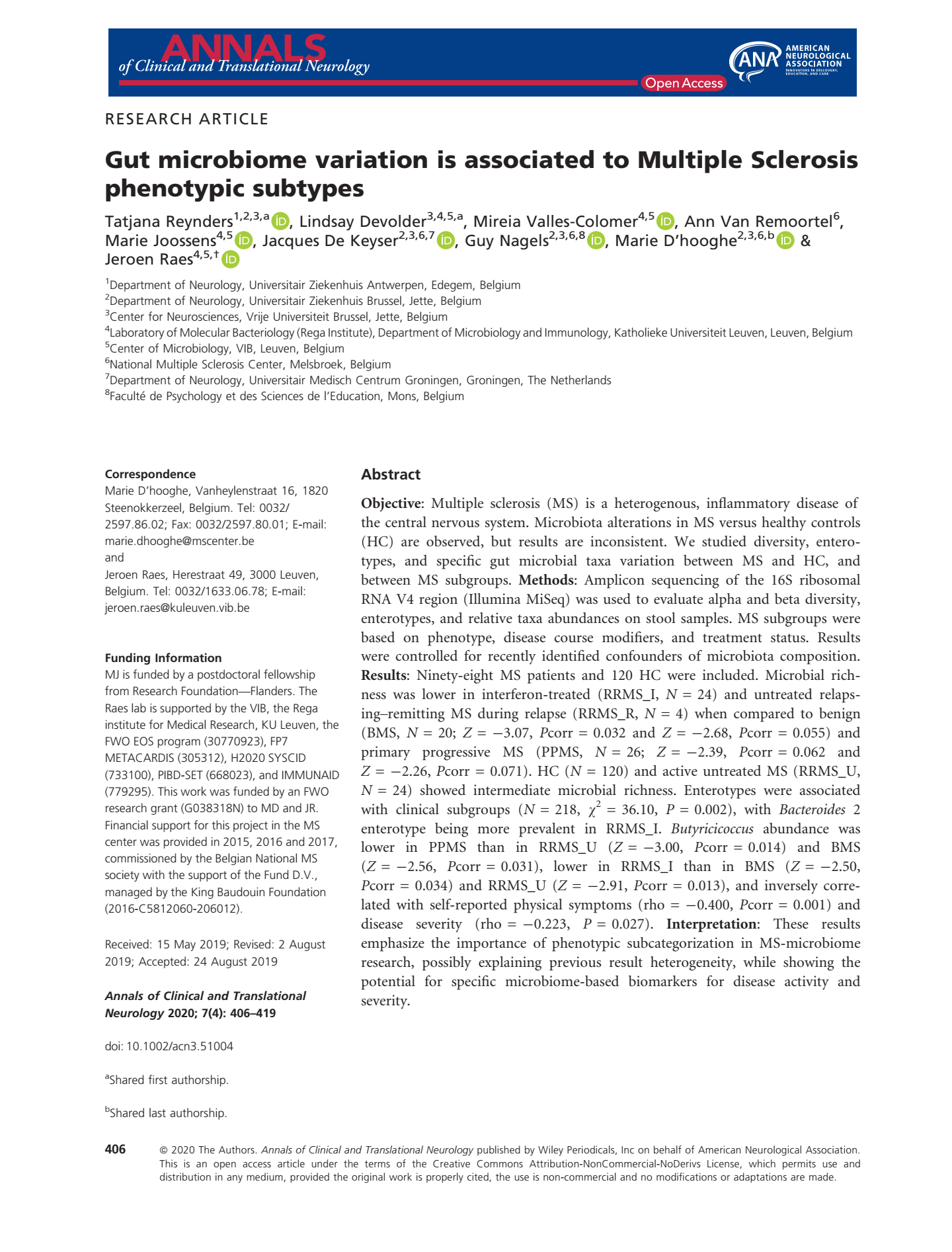Bağırsak mikrobiyom varyasyonu, Multiple Skleroz fenotipik alt tipleri ile ilişkilidir
Amaç
Multipl skleroz (MS), merkezi sinir sisteminin heterojen ve inflamatuar bir hastalığıdır. MS'de sağlıklı kontrollere (SK) karşı mikrobiyota değişiklikleri gözlemlenir, ancak sonuçlar tutarsızdır. MS ve SK arasındaki ve MS alt grupları arasındaki çeşitlilik, enterotipler ve spesifik bağırsak mikrobiyal takson varyasyonunu inceledik.
Yöntemler
16S ribozomal RNA V4 bölgesinin (Illumina MiSeq) amplikon dizilimi, dışkı örneklerinde alfa ve beta çeşitliliğini, enterotipleri ve nispi takson bolluğunu değerlendirmek için kullanıldı. MS alt grupları fenotip, hastalık seyri değiştiricileri ve tedavi durumuna dayanıyordu. Sonuçlar, mikrobiyota bileşiminin yakın zamanda tanımlanan karıştırıcıları için kontrol edildi.
Sonuçlar
Doksan sekiz MS hastası ve 120 sağlıklı kontrol (SK) çalışmalara dahil edildi. İyi huylu (BMS, N = 20; Z = -3.07, Pcorr = 0.032 ve Z = -2.68, Pcorr = 0.055) ve birincil ilerleyici (PPMS, N = 26; Z = -2.39, Pcorr = 0.062 ve Z = -2.26, Pcorr = 0.071) MS hastalarında mikrobiyal zenginlik daha düşük bulundu. Sağlıklı kontrollerde (N = 120) ve tedavi edilmemiş aktif MS hastalarında (RRMS_U, N = 24) orta düzeyde mikrobiyal zenginlik gösterdi. Enterotipler, klinik alt gruplarla (N = 218, χ2 = 36.10, P = 0.002) ilişkilendirildi ve Bacteroides 2 enterotipi RRMS_I'de daha yaygındı. Butyricoccus bolluğu PPMS'de RRMS_U'dan (Z = −3.00, Pcorr = 0.014) ve BMS'den (Z = −2.56, Pcorr = 0.031), RRMS_I'de BMS'den (Z = −2.50, Pcorr = 0.034) ve RRMS_U'dan daha düşüktü (Z = -2,91, Pcorr = 0,013) ve kişinin bildirdiği fiziksel semptomlar (rho = -0,400, Pcorr = 0,001) ve hastalık şiddeti (rho = -0,223, P = 0,027) ile ters orantılı olduğu gözlemlendi.
Yorumlar
Bu sonuçlar, MS-mikrobiyom araştırmalarında fenotipik alt kategorizasyonun önemini vurgular, muhtemelen önceki sonuç heterojenliğini açıklarken, hastalık aktivitesi ve şiddeti için spesifik mikrobiyom bazlı biyobelirteçlerin potansiyelini gösterir.
Makalenin tam metnine aşağıdaki bağlantıdan ulaşabilirsiniz:
https://onlinelibrary.wiley.com/doi/full/10.1002/acn3.51004
